Self-Help Written Exposure Therapy (WET) For Scam Victim Recovery
Principal Category: Scam Victim Recovery
Authors:
• Tim McGuinness, Ph.D. – Anthropologist, Scientist, Director of the Society of Citizens Against Relationship Scams Inc.
Scams, especially those involving betrayal, can cause severe emotional distress, including PTSD. Written Exposure Therapy (WET) is an emerging, evidence-based approach designed to treat PTSD by having individuals write about their traumatic experiences in a structured way, aiding in emotional and cognitive processing. This therapy’s principles, grounded in cognitive-behavioral therapy, involve confronting the trauma, challenging distorted beliefs, and achieving emotional relief. WET’s benefits for scam victims include its accessibility, efficiency, and the safe environment it provides for confronting distressing memories. Self-help WET involves scheduled writing sessions focusing on different aspects of the trauma, from describing the event to challenging negative beliefs. While self-administered WET can be beneficial, professional guidance is recommended, especially if symptoms worsen. Overall, WET offers scam victims a practical tool for managing PTSD symptoms, promoting recovery, and regaining control over their mental health.

Written Exposure Therapy (WET) for Scam Victims with Trauma or PTSD Symptoms – An Overview and Self-Help Guide
Introduction to Written Exposure Therapy (WET)
Scams, particularly those involving relationships and betrayal, can lead to severe emotional and psychological distress, including post-traumatic stress disorder (PTSD). Scam Victims often grapple with feelings of betrayal, loss, and humiliation, which can significantly impact their mental health.
Written Exposure Therapy (WET) is an emerging therapeutic approach that shows promise in addressing PTSD symptoms in individuals suffering from psychological trauma.
This article explores the application of WET for scam victims, outlining its principles, benefits, and implementation. However, we strongly recommend seeing a mental health professional or doctor before beginning any new process in treating trauma.
Understanding PTSD in Scam Victims
PTSD is a mental health condition triggered by a traumatic event, leading to symptoms such as intrusive memories, severe anxiety, and emotional numbness. Scam victims may experience PTSD due to the profound betrayal and emotional manipulation involved in the scam. This condition can severely impair daily functioning and quality of life, making effective treatment essential.
What is Written Exposure Therapy (WET)?
WET is a brief, evidence-based intervention designed to treat PTSD. It involves writing about the traumatic event in a structured and systematic way, helping individuals process and integrate their experiences. Unlike traditional exposure therapies, WET does not require repeated exposure to trauma cues or detailed recounting of the traumatic event, making it a more accessible option for many patients.
Principles of Written Exposure Therapy
WET is grounded in the principles of cognitive-behavioral therapy (CBT) and exposure therapy. It focuses on the following key elements:
Exposure: By writing about the traumatic event, individuals confront their trauma in a controlled and safe environment, reducing the intensity of their emotional responses over time.
Cognitive Processing: Writing helps victims make sense of their experiences, challenging distorted beliefs and facilitating cognitive restructuring.
Emotional Processing: The act of writing allows individuals to express and process their emotions, leading to emotional relief and healing.
Benefits of WET for Scam Victims
WET offers several benefits for scam victims dealing with PTSD:
Accessibility: WET can be conducted in various settings, including at home or in a therapist’s office, and requires minimal resources.
Efficiency: WET typically involves five sessions, making it a time-efficient treatment option.
Safety: Writing about the trauma provides a safe way to confront distressing memories without the need for direct exposure to trauma cues.
Empowerment: WET empowers victims by giving them control over their healing process and encouraging active engagement in their recovery.
Implementation of WET for Scam Victims
Implementing WET for scam victims involves several steps:
Initial Assessment: A licensed mental health professional assesses the victim’s PTSD symptoms and suitability for WET.
Preparation: The therapist explains the WET process and sets expectations, emphasizing the confidentiality and therapeutic goals of the writing exercises.
Writing Sessions: Over five sessions, the victim writes about their scam experience in detail. Each session typically lasts 30 minutes and is followed by a brief discussion with the therapist.
Review and Reflection: After each writing session, the therapist helps the victim reflect on their experience, discussing any insights or emotional responses that emerged.
Closure: The final session focuses on summarizing the victim’s progress, reinforcing coping strategies, and planning for future well-being.
Self-Administered Written Exposure Therapy (WET) for Scam Victims with PTSD
While it’s always best to seek professional guidance when dealing with PTSD, some scam victims may prefer or need to start their healing journey on their own. Written Exposure Therapy (WET) can be a beneficial self-help tool for managing PTSD symptoms.
Here’s a step-by-step guide for scam victims who want to try WET independently. However, we do recommend discussion this with your mental healthcare professional.
Understanding the Basics of Self-Help Written Exposure Therapy (WET)
WET involves writing about the traumatic event in a structured manner to help process and integrate the experience. The goal is to confront and work through the trauma, reducing its emotional impact over time.
Preparing for Self-Help Written Exposure Therapy (WET)
Set a Safe Environment: Choose a quiet, comfortable place where you won’t be interrupted. Ensure you have privacy and feel safe.
Gather Supplies: Have a notebook or computer, and any other materials you need for writing.
Schedule Regular Sessions: Plan to write for about 30 minutes, five times over the next few weeks, this allows some time for any triggers caused during the previous session to calm. Consistency is key. It has been suggested that every 3 days may be suitable.
Steps to Conduct Self-Help Written Exposure Therapy (WET)
Session 1: Introduction to the Trauma
Write about the scam experience in detail. Describe what happened, focusing on the facts of the event.
Be as detailed as possible, including who was involved, what was said, and how you felt during the experience.
Session 2: Expanding the Narrative
Re-read what you wrote in the first session.
Expand on the details, focusing on your emotional responses and thoughts during the scam.
Include any physical sensations you experienced.
Session 3: Exploring the Impact
Reflect on how the scam has affected your life. Write about the emotional, social, and financial impacts.
Discuss any changes in your behavior, relationships, and self-perception.
Session 4: Challenging Negative Beliefs
Identify any negative beliefs or cognitive distortions you have about yourself because of the scam (e.g., “I am gullible,” “I can’t trust anyone”).
Challenge these thoughts. Write down evidence that contradicts these beliefs and consider more balanced perspectives.
Session 5: Reflecting and Planning for the Future
Reflect on what you’ve written over the previous sessions. Summarize your insights and any progress you’ve made.
Write about your coping strategies and plan how to continue your recovery journey. Consider steps you can take to rebuild trust and self-esteem.
It is suggested that you share the writings with your therapist to coordinate this approach with the therapy you may be receiving.
Tips for Effective Self-Help Written Exposure Therapy (WET)
Be Honest and Open: Write freely and honestly. Don’t worry about grammar or spelling; the focus is on expressing your thoughts and feelings.
Take Breaks if Needed: If the writing becomes too distressing, take a break. It’s important to feel safe throughout the process.
Practice Self-Care: Engage in self-care activities after each session, such as deep breathing, meditation, or spending time with loved ones.
Stay Consistent: Try to stick to your writing schedule. Consistency helps in processing the trauma more effectively.
Recognizing When to Seek Professional Help
While Self-Help Written Exposure Therapy (WET) can be helpful, it’s important to recognize when professional help is needed:
Intensified Symptoms: If your PTSD symptoms worsen or become overwhelming, seek help from a licensed mental health professional.
Suicidal Thoughts: If you experience suicidal thoughts, contact a mental health crisis line or seek immediate help. Need To Talk? Call 988 NOW for Phone Help in the U.S. & Canada
Persistent Distress: If you continue to feel significant distress despite completing WET, professional therapy can provide additional support and strategies. You can find counseling or therapy at counseling.AgaibstScams.org
Summary
Written Exposure Therapy (WET) offers a promising avenue for scam victims suffering from trauma or PTSD.
Its structured, yet flexible approach allows individuals to confront and process their trauma in a safe and controlled manner. By providing scam victims with a practical and effective tool for managing their PTSD symptoms, WET can play a useful role in their journey toward recovery and healing.
Seeking professional support is always recommended, and engaging in therapies like WET can help scam victims regain control over their lives and mental health, underscoring the importance of accessible and effective treatment options for trauma-related conditions.
By following these self-help steps, you can start processing the trauma and move toward healing.
Remember, there is no shame in seeking help when needed. Whether you start with self-administered WET or move on to professional therapy, taking steps to address your mental health is a courageous and essential part of your recovery.
Please Leave Us Your Comment
Also, tell us of any topics we might have missed.
IMPORTANT NOTE: This article is intended to be an introductory overview of complex psychological, neurological, physiological, or other concepts, written primarily to help victims of crime understand the wide-ranging actual or potential effects of psychological trauma they may be experiencing. The goal is to provide clarity and validation for the confusing and often overwhelming symptoms that can follow a traumatic event. It is critical to understand that this content is for informational purposes only and does not constitute or is not a substitute for professional medical advice, diagnosis, or treatment. If you are experiencing distress or believe you are suffering from trauma or its effects, it is essential to consult with a qualified mental health professional for personalized care and support.

Welcome to the SCARS INSTITUTE Journal of Scam Psychology
A Journal of Applied Scam, Fraud, and Cybercrime Psychology – and Allied Sciences
A dedicated site for psychology, victimology, criminology, applied sociology and anthropology, and allied sciences, published by the SCARS INSTITUTE™ – Society of Citizens Against Relationship Scams Inc.
TABLE OF CONTENTS
A Question of Trust
At the SCARS Institute, we invite you to do your own research on the topics we speak about and publish, Our team investigates the subject being discussed, especially when it comes to understanding the scam victims-survivors experience. You can do Google searches but in many cases, you will have to wade through scientific papers and studies. However, remember that biases and perspectives matter and influence the outcome. Regardless, we encourage you to explore these topics as thoroughly as you can for your own awareness.
Please Leave A Comment
Recent Comments
On Other Articles
[better_recent_comments number=”5″ format=”{avatar} on {post}: “{comment}” {date}” avatar_size=”20″]
A Note About Labeling!
We often use the term ‘scam victim’ in our articles, but this is a convenience to help those searching for information in search engines like Google. It is just a convenience and has no deeper meaning. If you have come through such an experience, YOU are a Survivor! It was not your fault. You are not alone! Axios!
Statement About Victim Blaming
Some of our articles discuss various aspects of victims. This is both about better understanding victims (the science of victimology) and their behaviors and psychology. This helps us to educate victims/survivors about why these crimes happened and to not blame themselves, better develop recovery programs, and to help victims avoid scams in the future. At times this may sound like blaming the victim, but it does not blame scam victims, we are simply explaining the hows and whys of the experience victims have.
These articles, about the Psychology of Scams or Victim Psychology – meaning that all humans have psychological or cognitive characteristics in common that can either be exploited or work against us – help us all to understand the unique challenges victims face before, during, and after scams, fraud, or cybercrimes. These sometimes talk about some of the vulnerabilities the scammers exploit. Victims rarely have control of them or are even aware of them, until something like a scam happens and then they can learn how their mind works and how to overcome these mechanisms.
Articles like these help victims and others understand these processes and how to help prevent them from being exploited again or to help them recover more easily by understanding their post-scam behaviors. Learn more about the Psychology of Scams at www.ScamPsychology.org
Psychology Disclaimer:
All articles about psychology, neurology, and the human brain on this website are for information & education only
The information provided in these articles is intended for educational and self-help purposes only and should not be construed as a substitute for professional therapy or counseling.
While any self-help techniques outlined herein may be beneficial for scam victims seeking to recover from their experience and move towards recovery, it is important to consult with a qualified mental health professional before initiating any course of action. Each individual’s experience and needs are unique, and what works for one person may not be suitable for another.
Additionally, any approach may not be appropriate for individuals with certain pre-existing mental health conditions or trauma histories. It is advisable to seek guidance from a licensed therapist or counselor who can provide personalized support, guidance, and treatment tailored to your specific needs.
If you are experiencing significant distress or emotional difficulties related to a scam or other traumatic event, please consult your doctor or mental health provider for appropriate care and support.
Also, please read our SCARS Institute Statement About Professional Care for Scam Victims – here
If you are in crisis, feeling desperate, or in despair please call 988 or your local crisis hotline.
SCARS Institute Resources:
- If you are a victim of scams, go to www.ScamVictimsSupport.org for real knowledge and help
- Enroll in SCARS Scam Survivor’s School now at www.SCARSeducation.org
- To report criminals, visit reporting.AgainstScams.org – we will NEVER give your data to money recovery companies like some do!
- Sign up for our free support & recovery help at www.SCARScommunity.org
- Follow us and find our podcasts, webinars, and helpful videos on YouTube: www.youtube.com/@RomancescamsNowcom
- SCARS Institute Songs for Victim-Survivors: www.youtube.com/playlist…
- Learn about the Psychology of Scams at www.ScamPsychology.org
- Dig deeper into the reality of scams, fraud, and cybercrime at www.ScamsNOW.com and www.RomanceScamsNOW.com
- Scam Survivor’s Stories: www.ScamSurvivorStories.org
- For Scam Victim Advocates, visit www.ScamVictimsAdvocates.org
- See more scammer photos on www.ScammerPhotos.com


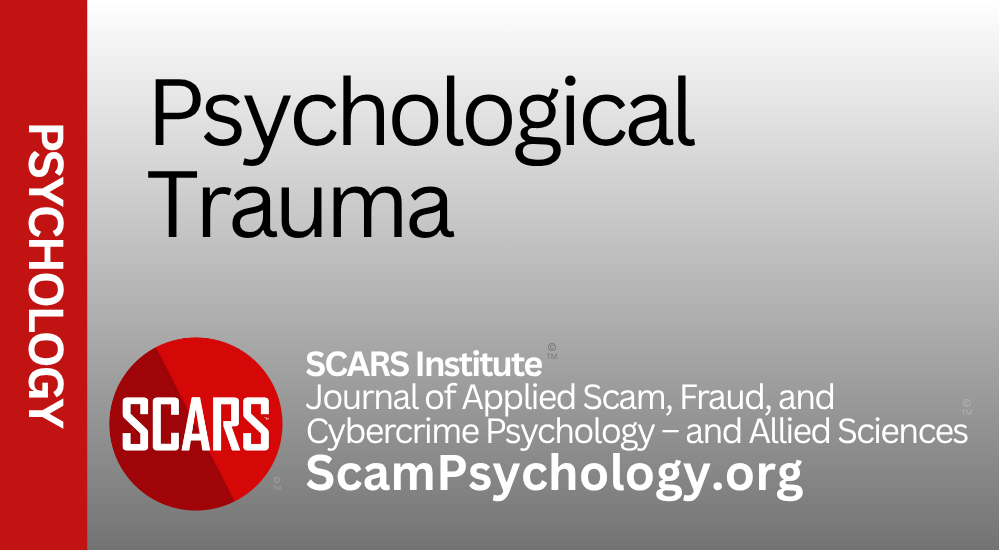
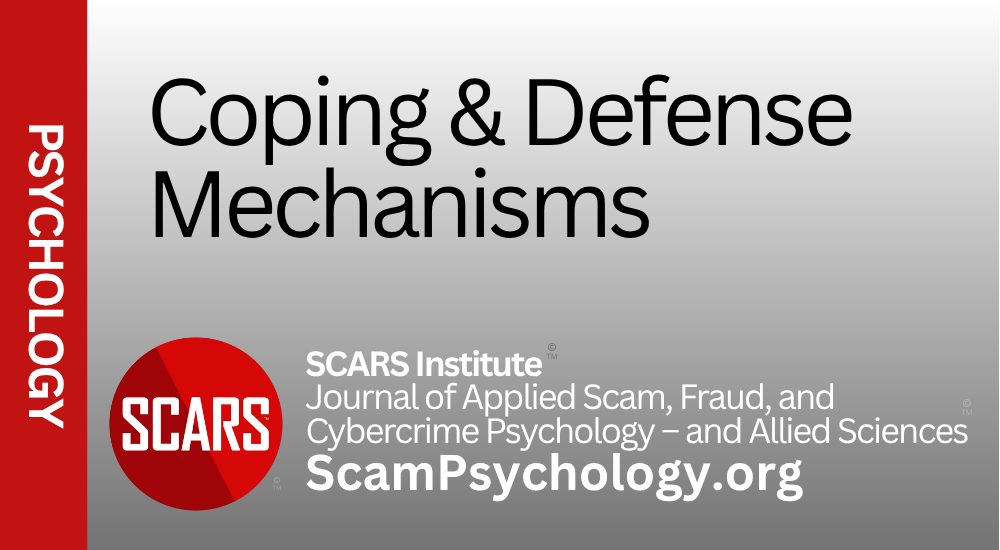
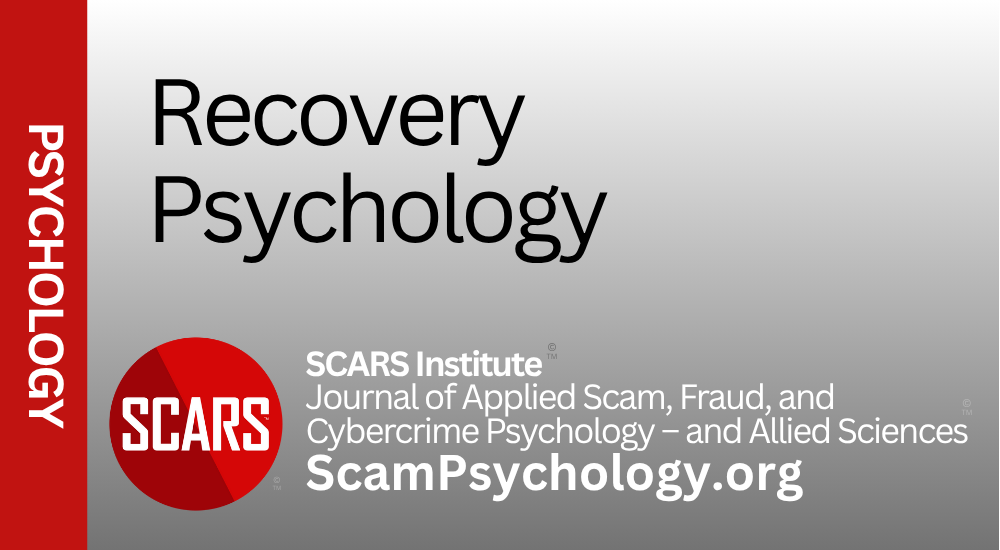
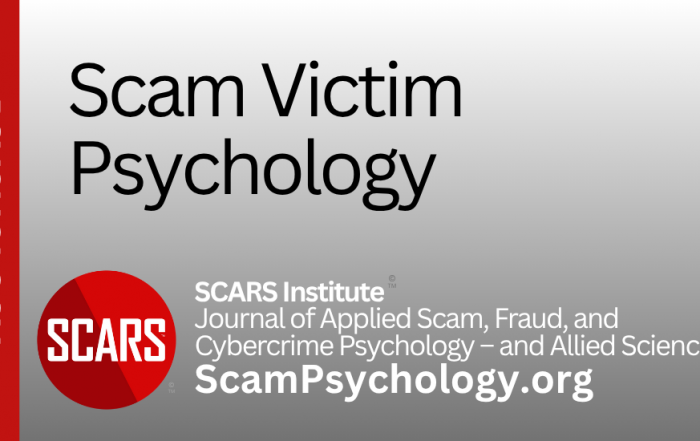
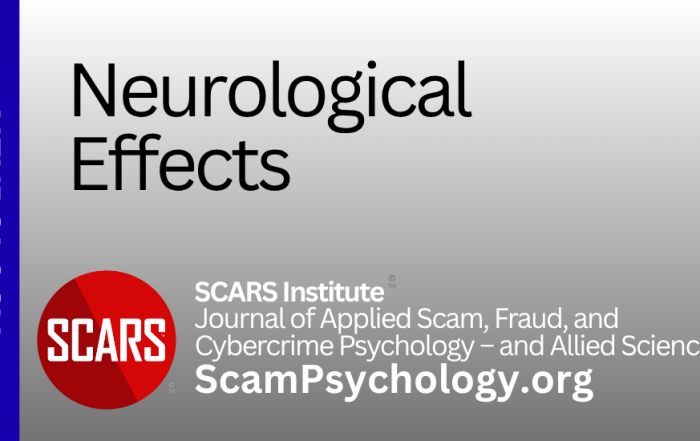

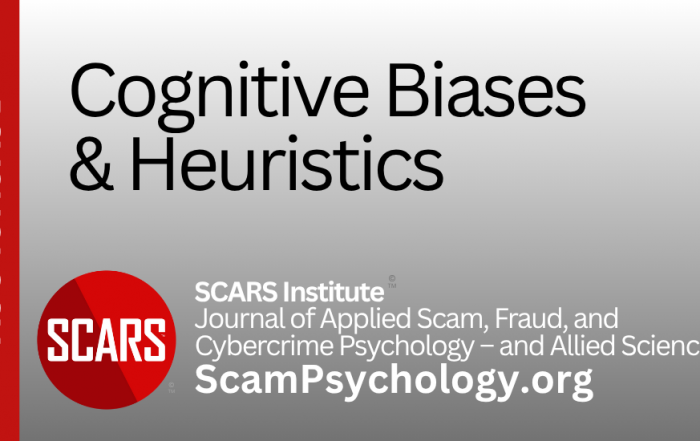
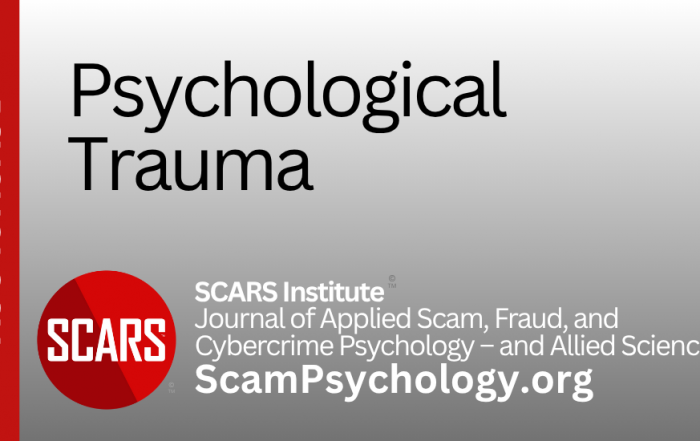
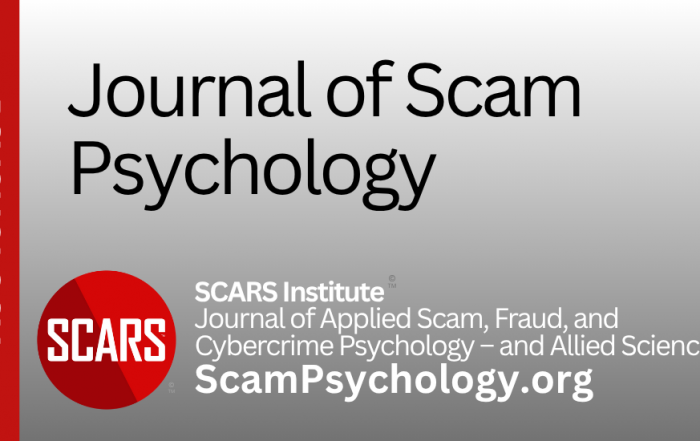
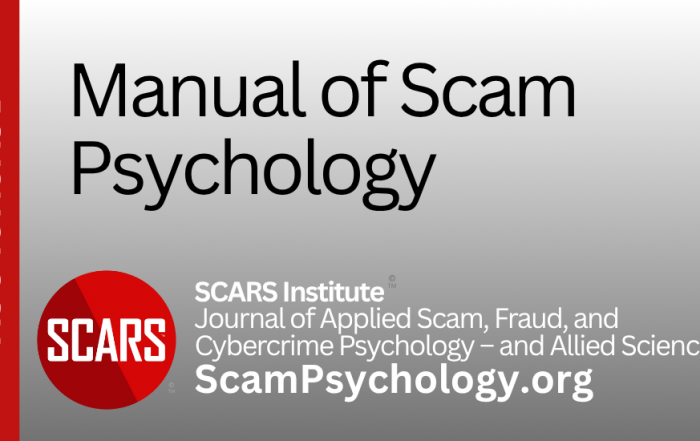

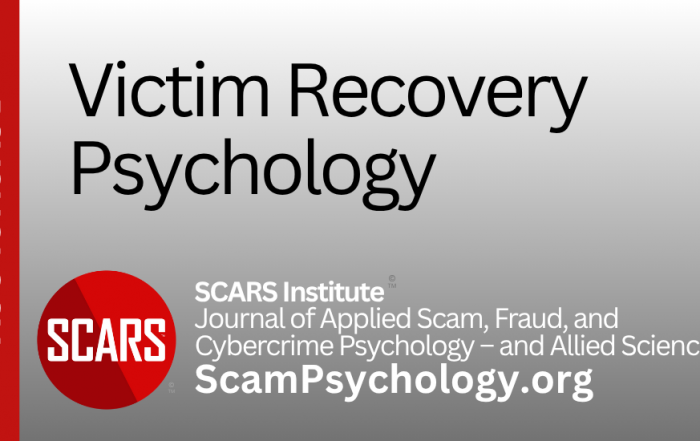

![niprc1.png1_-150×1501-11[1]](https://scampsychology.org/wp-content/uploads/2025/05/niprc1.png1_-150x1501-111.webp)